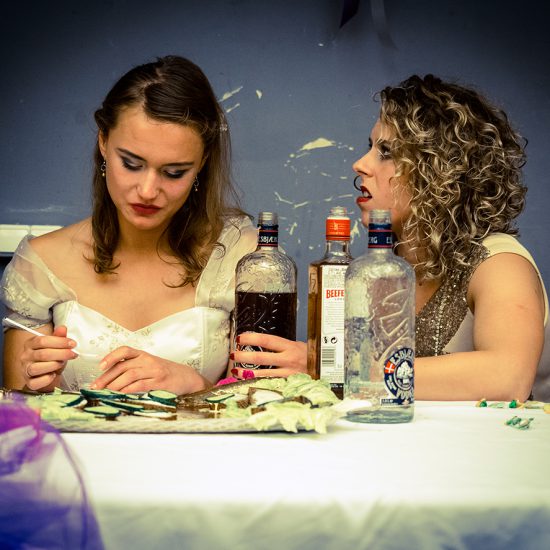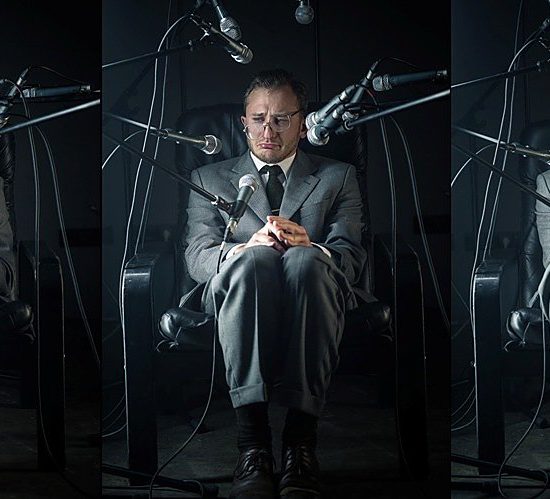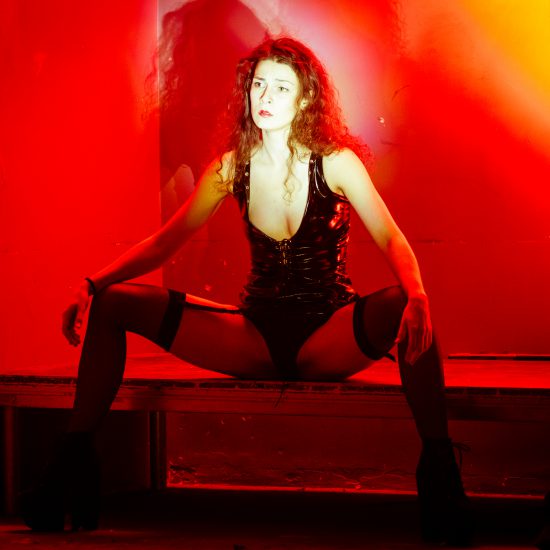The Name of the Tempest – Miranda
Oskaras Koršunovas’s Miranda is one of the most exciting theater performances I have recently seen: in terms of attitude towards culture, history, society and oneself. Yet, it is not a perfect creation because perfection does not leave us the right to ask. Beneath these words are inventive directorial decisions and a unique interpretation of William Shakespeare’s The Tempest. On the eve of 2011, the Koršunovas directed The Tempest in Reykjavik City Theatre in Iceland. Now the director presents an entirely different interpretation.
In the space created by Koršunovas, the characters of the colorful allegorical tale about the ruler of Milan, Prospero and his daughter Miranda can not expect a happy ending – and not only because the action here takes place in the interior of a small apartment in a Soviet apartment block (set designer – Dainius Liškevičius, costume designer – Aleksandras Pogrebnojus). This little familiar setting seems etched in the dark space of the theater arena. It is dangerously floating even before the show begins – as people are going to their seats, it is flung about by the storm of Pyotr Tchaikovsky’s “Swan Lake”, Which later claims the lives of those who betrayed and those who had been betrayed. There is no safe harbor for the ships that have not been destroyed by Prospero’s magic storm, and the sailors dressed in clothes even cleaner than before the storm.
Shakespeare’s text is always the bait of the performance; Koršunovas keeps its wisdom, irony and beauty, even though the text also melts in the space filled with Soviet artifacts. And it makes you want to take a closer look at it, to touch the whatnots exhibited in front of the books, leaf through the stacked books, and have a look at the vinyl Melodia records.
<…>
Miranda unfolds slowly – Shakespeare’s The Tempest is trapped in the book, which a nameless character gives to his disabled daughter – Prospero of the world created on the stage. The tempest is literally and figuratively created by everything – by the hiss of the radio, by the burnt and steaming pot, even by the vacuum cleaner (an old Lithuanian-made vacuum cleaner Audra (Storm, tempest)). But the most important tempest takes place inside the characters’ heads – it breaks them, connects them, raises them up and mercilessly throws them down. The story of the father and daughter, told slowly and consistently in the beginning, quickly turns into a fragmented stream of images, which destroys the linear reality and makes us doubt whether the action takes place in the director’s, the characters’, or, perhaps, the viewer’s imagination? The half empty bottle of vodka, the drink which Prospero later eats with a spoon from a bowl, is just one of the many evidences of his irreversibly crumbling world.
<…>
Povilas Budrys … In Miranda he impersonates all of them: the caring Prospero, the ruthless Antonio, the good-natured Gonzalo, whose intonations resemble Gorbachev’s, the aggressive Caliban, and the well-mannered Ferdinand. Shakespeare’s text pronounced by him sounds both ominous and lyrical, alternating uncontrolled fury with sober resignation. Well into the performance the character created by Budrys becomes his daughter’s father, abuser and lover, while his apartment sometimes resembles the frightening dungeon of Joseph Fritzl.
It has been a while since we have seen Airida Gintautaitė on stage. In Miranda the actress presents an interesting drawing of her heroine – in the beginning she slumbers in her rocking chair covered with a checkered scarf, but then she spreads her deformed arms, moving like the dancing swan from the screen of the black-and-white TV. Her transformation into Ariel is spectacular – squeezed into the most sacred place of the lacquered modular cabinet – the “secretaire” with a mirrored wall – she sputters out Shakespeare’s text, and appears in the doorway shortly after, accompanied by dazzling flashes of light. In the brightest scene of the play, combining the qualities of Miranda-miracle and Ariel-air, she rises above her depressing earthly home, and leaves Prospero like his brightened soul, only to come back a while later as a grotesque swan desperately flopping about to Tchaikovsky’s music.
<…>



